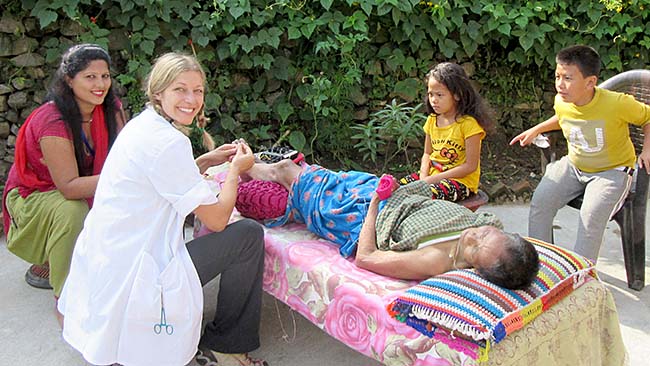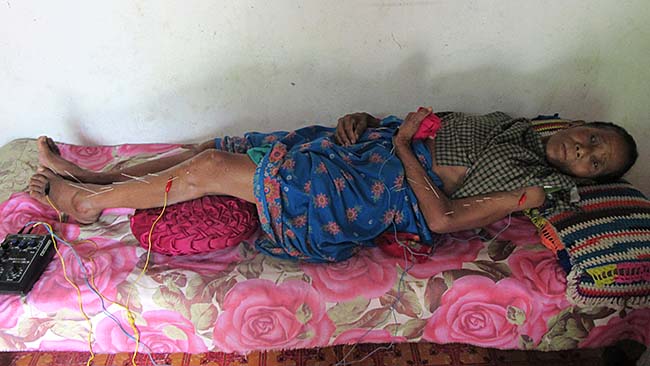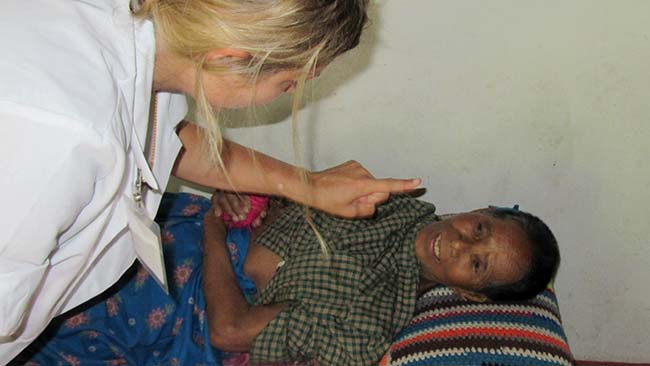
Well, I survived my first week of clinic. Luckily for us it started off slower than expected which gave us a chance to get our feet wet. I'm finally feeling some rythym in the treatment room. I am impressed with everyone's ability to work together and lean on each other. The interpreters are doing an amazing job as well. I am so impressed by their eagerness to learn. Being a practitioner in Nepal is challenging and humbling at times. There are times when you do not have the anwsers, the skills, or the resources you need to help a patient. We must be okay with asking for help from others because working here in this environment is hard enough. And sometimes It's okay to just admit defeat. This leads me to vulnerability. Not something many of us like to experience. When I decided to come here I thought it was because I wanted to help people and I wanted to become a better practitioner. And both of those things are true. Although I think my patients are probably gonna help me become a better practitioner more so than me helping them with their problems. I am learning so much from them which will be valuable for me in my practice. Their health is so poor and they have so little here, yet their smiles remain and their lives continue. Not to say I am not getting good results; I am definatly seeing some improvement in my patients, but it seems only natural when they are coming to see you three times a week. But some situations we just cannot change. At times It gets so busy I feel like I am doing the same treatment on everyone or I am using too many needles just to cover my bases. You never have a moment to think about your treatment plan, you just listen to their story and act. I promise in time I will be more thoughtful about my treatment plans and use less needles.

But today I realized I came for another reason; to explore myself and what is means to be a practitioner. I initially went into healthcare because honestly, I just didn't feel really good at anything else. Coming from a long line of nurses, I strived to be different, but helping others always called to me and that's what I'm good at. I wanted to connect with people, understand compassion and humanity. I feel so detatched from myself at times at home working in the intensive care unit. We just go about our days, going through the motions, thinking we are doing good and helping people, but are we? In the hospital I practice my skills, take orders and give medications. If there is something that goes wrong I call the doctor and they handle it. Here, we don't have that luxury. In my clinic I hear patients problems and I treat them with acupuncture or herbs and I can rest assured in the fact that they are also probably seeing multiple other practitioners. But I wanted to put myself in an environment where I would need to use all my skills without relying on all the resources or luxuries we have at home. I wanted to tap back into why I went into medicine in the first place. To understand compassion, humanity and altruism. I feel like those things are rare in life, and here in Nepal I see it everywhere. I have a wonderful family, lots of friends and a great man at home, but something has always felt lacking in my life and today I felt it. We are so closed off as westerners and here I've realized I'm guilty of that myself. Nepali people's hearts are so open and there is a sense of community no matter where you are. It is so easy to connect with people here, like family. And today we came together as a community to help this patient. And I better understood compassion and humanity.

Today I was challenged in every way I could imagine. I was forced to be a primary care practitioner; a role I have not had to play. And I was scared. A young women came into the clinic, first visit. She was only 24 years old and was four months pregnant. She complained of a mass in her abdomen that was getting larger and becoming painful. I felt it and it was pulsating. I then noticed the young woman was breathing rather fast and also noticed the pulsation going up to her neck. After chebking her vital signs and listening to her heart (which she had a very clear murmur) I decided she needed to be transported to the hospital for a further cardiac evaluation. I decided not to treat this patient with acupuncture but use my efforts to locate family and call an ambulance in addition to discussing the case with my team leader. I knew what I would do at home, but this is Nepal. We could not get a hold of the one ambulance in town and the health post was closed for another hour. So we decided to wait. Not something I would do at home. We had a choice of sending this frightened woman on one of our interpreters motorcycle to get to the hospital an hour away or waiting on the ambulance to take her which would be a few hours. I had to make a choice. I don't usually have to make these choices! I just wanted her out of our clinic to a place where she could be stabilized if need be, but what where would that be? From my experience I suspected an dissecting aortic aneurysm, left untreated could be fatal. My 24 year old pregnant patient and her husband are now looking at me for answers on what to do and how much this will cost because they have no financial resources. I felt helpless. There was so much I wanted to do for her, but couldn't. I couldn't fix her problems, afford to pay all the bills or promise she would make it. The ride alone to Kathmandu would be four hours. All I could do was get her in an ambulance and hope I was wrong. She is now in a hospital in Kathmandu getting care. They will run a series of test that they probably cannot afford, and may find out she needs surgery she cannot have because she is pregnant. I guess I could have treated her, hoped I was wrong and sent her home with her family to celebrate the upcoming festival like she wanted to do, but I couldn't. I'm not sure what the right decision should have been. I don't know if we will know the outcome of this situation. So many of our patients have situations that would be considered life threatening to us, but here it's just part of life. I feel defeated no matter the outcome. If you think you have helped someone by sending them to a higher level of care, you have probably helped them rack up a bill they will never be able to afford. And when you see how hard these people work just for sixty bucks a month or less you don't want to waste their resources. But if you do nothing, they could die in your care. Being responsible for that decision is nothing to take lightly. Working in the clinic and staring into your patients eyes and seeing so much pain is heartbreaking. The conditions here are rough and sad, and it wears on you. Even if you make a positive change in their condition they still have to work and that usually involves carrying 85 lbs of wood on their heads or backs and walking hours a day in the fields or to the next town. So We can only do so much, and that has to be okay for now.
I received word today from the patient's husband. She has been transferred from the heart hospital to another hospital for urgent surgery, but it will cost 200,000 rupees (about $2000 USD). The family must pay it before they will do the surgery, and of course they want our help. The practitioners donated money to pay for the ambulance, but now we have to make the decision. I'm sure we would all pay for the surgery if we could, but that's not the point. Everyone here is under the poverty line. How do you decide who you help and who you don't? It's the hardships here that is life. Its breaks your heart, and toughens your skin at the same time. Even with all the good we do here, sometimes it feels like you are not doing enough. - Jacqueline (Jacq) Bailey
Director's Note: Jacqueline probably saved this young woman's life (and possibly the life of her unborn baby) by quickly identifying her life threatening condition and taking proper action. The practitioners took a collection amongst themselves to pay for the ambulance transport to the hospital in Kathmandu. Our organization appealed to the Manawanpur District Health office for financial support for the patient and they paid for half of her surgical expenses. The young woman underwent open heart surgery to repair a dissected aorta and is now stable and recovering though not completely in the clear. All of this illustrates the roll of our project in providing access to medical care and appropriate assessment. No single intervention is complete without the support of an entire medical system and we strive to play our part in applying the RIGHT MEDICINE at the RIGHT MOMENT. I humbly congratulate Jacqueline for a job done to perfection. -Andrew Schlabach, Director, Acupuncture Relief Project.











